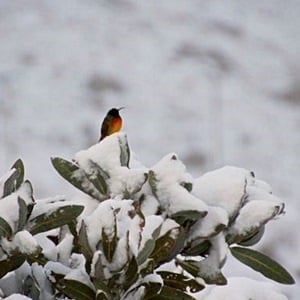
Infants exposed to high levels of pollen and mold in their first few months of life are more likely to develop wheezing - a possible early symptom of asthma, say US researchers.
They studied 514 children born in 1999 and 2000 in California's Salinas Valley, and found that children born in high mold season (autumn and winter) were three times more likely to develop wheezing by age 2 than children born at other times of the year. The researchers also found that total pollen concentration exposure during the first three months of life increased the risk of early wheezing.
40% develop asthma
As many as 40% of children who wheeze early in life may go on to develop childhood asthma, especially if they have other allergic symptoms, according to the authors of the study, published in the journal Thorax.
The findings may help clarify why babies born in autumn and winter appear to have a higher risk of developing asthma than children born in the summer.
One previous study found that babies born in the fall are at greater risk of developing childhood asthma. The authors of that study suggested that early-life exposure to respiratory viruses during the peak cold and flu season may be to blame.
Pollen's seasonal patterns
"In our study, we took a different tack to understand the link between month of birth and asthma by considering ambient concentrations of fungal spores and pollen, which follow distinct seasonal patterns," study author Kim Harley, associate director of health effects research at UC Berkeley's Centre for Children's Environmental Health Research, said in a university news release.
"Until our paper, there were very little data about exposure to allergens in the air, which we know can trigger symptoms for those who already have asthma. This is the first study to look at the potential role of early life exposure to multiple outdoor fungal and pollen groups in the development of asthma," Harley said.
She and her colleagues were continuing to follow the children in the study.
Other factors to consider
"We are not in a position to say conclusively why some children develop asthma, or to even suggest precautionary measures to help babies born in the fall and winter," study senior author Dr Ira Tager, professor of epidemiology, said in the news release. "We already know that family history is a major risk factor for developing asthma, but the role environmental factors play is still being fleshed out. What this study does is provide valuable clues about airborne allergens that are worth exploring further." – (HealthDay News, February 2009)




 Publications
Publications
 Partners
Partners














